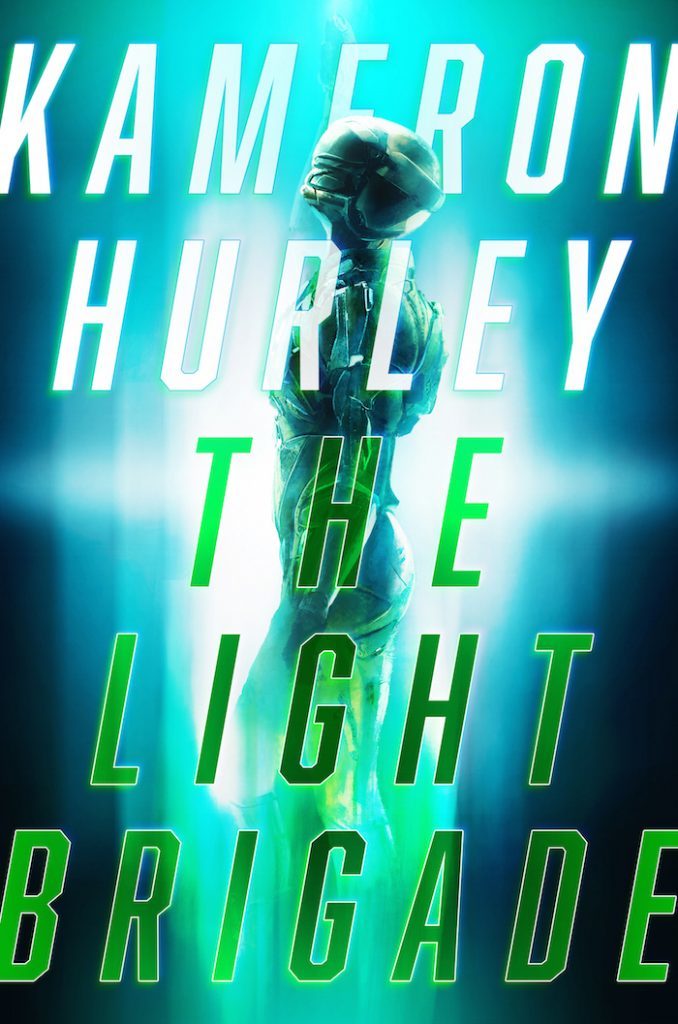 The
Light Brigade: it's what soldiers fighting the war against Mars call the ones who come back... different. Grunts
in the corporate corps get busted down into light to travel to and from interplanetary battlefronts. Everyone is
changed by what the corps must do in order to break them down into light. Those who survive learn to stick to the
mission brief—no matter what actually happens during combat.
The
Light Brigade: it's what soldiers fighting the war against Mars call the ones who come back... different. Grunts
in the corporate corps get busted down into light to travel to and from interplanetary battlefronts. Everyone is
changed by what the corps must do in order to break them down into light. Those who survive learn to stick to the
mission brief—no matter what actually happens during combat.
Dietz, a fresh recruit in the infantry, begins to experience combat drops that don't sync up with the platoon's. And Dietz's bad drops tell a story of the war that's not at all what the corporate brass want the soldiers to think is going on.
Is Dietz really experiencing the war differently, or is it combat madness? Trying to untangle memory from mission brief and survive with sanity intact, Dietz is ready to become a hero—or maybe a villain; in war it's hard to tell the difference.
This was a hot mess.
Before I start, ignore the comparisons to Edge of Tomorrow. This is nothing like it. In that movie, Tom Cruise's character dies constantly only to loop back in time. Dietz, the main character and narrator in The Light Brigade, not only doesn't die all the time but moves forward and backward in time, which is more like Billy Pilgrim's experiences in Slaughterhouse-Five.
The story started out well. We're introduced to Dietz just before basic training, and we can tell that Dietz is a hothead, act-first-think-later kind of person with lots of baggage having grown up poor and lacking corporate citizenship. The basic training experience is brutal and puts the new recruits into awful situations. So it seems like this will be a grinder sci-fi novel focusing on the brutality of war and what it does to soldiers. Nope. Once Dietz experiences teleportation, we get a broken time travel story. For the record, if the transporter (the whole "busted down into light to travel" is totally reminiscent of Star Trek's transporter) ever broke down in Star Trek, you can bet that Scotty or O'Brien would be all over it, trying to get it repaired. Losing people in transporter accidents is horrible. But this is Bones' worst nightmare with people materializing in walls and with limbs misplaced. Here, it's just another day on the job. A lot of resources go into training soldiers; they're not disposable. And if you can teleport a soldier and all their gear, why not just teleport a nuke?
For a military sci-fi novel, there really isn't a whole lot of combat. Dietz's squad either teleports into a battlefield where they're slaughtered or they go into a police action against civilians where they vaporize them. Bodies explode with blood and viscera like a typical episode of Ash Vs. The Evil Dead.
Dietz's internal monologue and conversations with other soldiers are fairly insipid. A lot of dialogue is just repeated. You could make a drinking game out of the phrase "Stick to the brief", a reference to abiding by the mission brief and ignoring everything else. We're told that they're monitored all the time, so they have to watch what they say, but Dietz gets a watch with some kind of jamming device built into it and later corporate causalities have become so high that the corporation doesn't have enough people to monitor every conversation. I guess developing computer algorithms or AI was harder than teleportation. At the end of the novel Dietz suddenly figures things out and becomes all-knowing.
We're told that all of the world's governments have collapsed and been replaced by corporations. But there's nothing vaguely capitalistic about them. Sure they have CEOs, but corporations don't bomb markets and slaughter potential new customers (Mercenaries do, sure, I'll grant you that). Amazon has been accused of putting a lot of small businesses out to pasture, but Bezos did it by shrewdly taking advantage of new business models that the internet enabled. He didn't send a hitman to kill the owner of your local bookstore. In this book, these corporations are feudal empires controlled by kings and queens.
There are these interrogation transcripts that begin to pop up between chapters. Although neither Dietz nor the interrogator is identified, it's obvious it's them. We have to read this lame polemic which gradually turns into an argument which gets rehashed in each interrogation. This book was published in 2019, which means Hurley wrote this 2017-18. The whole interrogation reads like Hurley is taking her grievances with what was going on in the USA at the time and uses the space to rant. Maybe that's why people liked it so much. I think it's meant to be inspiring or make some people think, but while I'd agree with the points made, the way it was done reads like Dietz was just stating the obvious.
1.5 stars
\_/
DED
No comments:
Post a Comment